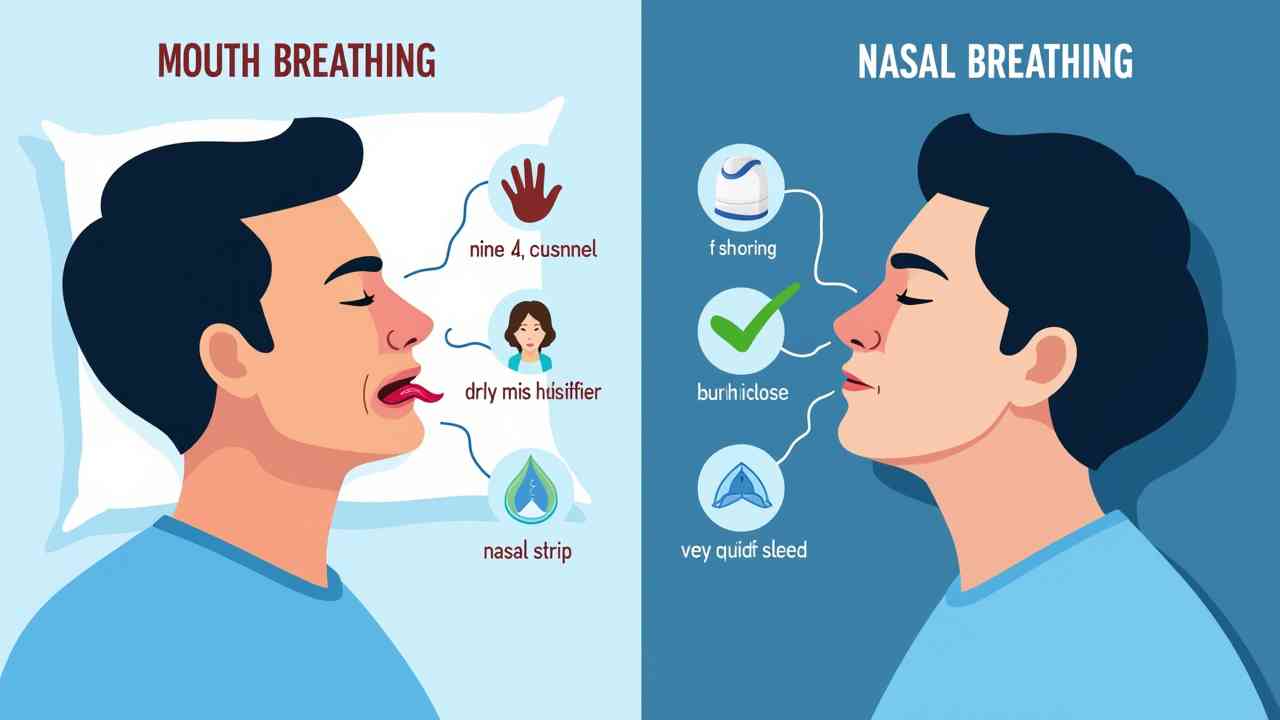
😴 Sleeping with Your Mouth Open? A Doctor Explains Why You Shouldn't
😴 A Doctor's Guide to Mouth Breathing During Sleep (Causes & Solutions) 😴
Waking up with a desert-dry mouth, a sore throat, and a general feeling of fatigue is a common complaint. The likely culprit? Sleeping with your mouth open. While it might seem like a harmless habit, chronic mouth breathing during sleep can be a sign of an underlying issue and can lead to a host of health problems, from bad breath to poor sleep quality.
This guide will explain why this happens, the risks involved, and the simple, effective strategies you can use to promote healthy nasal breathing. Let's get you on the path to a more restful and comfortable night's sleep. ✅
🤔 First, Why Do People Sleep with Their Mouths Open?
The number one reason is simple: you can't get enough air through your nose. Mouth breathing is your body's backup plan. Your body will always find a way to get the oxygen it needs. This nasal obstruction can be caused by several factors:
- Nasal Congestion: This is the most common cause. Allergies, a cold, or a sinus infection can block your nasal passages, forcing you to breathe through your mouth.
- A Deviated Septum: A structural issue inside the nose that can restrict airflow.
- Sleeping Position: Sleeping on your back can sometimes cause your jaw to slacken and your mouth to fall open.
- What Are the Health Risks of Mouth Breathing?
Your nose is a brilliant filter, designed to warm, humidify, and clean the air you breathe. When you bypass this system by breathing through your mouth, it can lead to several problems.
- Severe Dry Mouth: This is the most immediate effect. A dry mouth is not just uncomfortable; it also creates the perfect environment for bacteria to thrive, increasing your risk of cavities and gum disease.
- Bad Breath (Halitosis): The changes in the oral bacteria caused by a dry mouth are a major cause of chronic bad breath.
- Increased Snoring & Sleep Apnea: Mouth breathing can make your airway less stable, which can lead to snoring and can worsen conditions like obstructive sleep apnea.
- Poor Sleep Quality: You are not getting the same quality of filtered, humidified air, which can lead to a less restful night and daytime fatigue.
✅ What Are the Best Ways to Stop Sleeping with Your Mouth Open?
The key is to address the root cause: the nasal obstruction. Here are the best strategies to try.
1. Treat the Congestion: If allergies or a cold are the culprit, treating them is the first step. A saline nasal rinse before bed can help to clear out mucus. Running a cool-mist humidifier in your bedroom can also add moisture to the air and soothe irritated nasal passages.
2. Try a Nasal Strip: These adhesive strips are placed on the outside of your nose. They work by gently pulling your nostrils open, which can physically improve airflow.
3. Elevate Your Head: Try sleeping with an extra pillow or on a wedge pillow. Elevating your head can help to promote sinus drainage and can prevent your jaw from falling open.
⚠️ What About 'Mouth Taping'?
Mouth taping has become a popular trend, but it comes with risks and is not recommended without a doctor's approval. If you have an undiagnosed nasal obstruction or sleep apnea, taping your mouth can be dangerous. You must consult with a doctor to ensure it is a safe option for you.
If you are a chronic mouth breather, the best first step is to see a doctor or an Ear, Nose, and Throat (ENT) specialist. They can determine the cause of your nasal obstruction and recommend the most effective treatment. 🩺